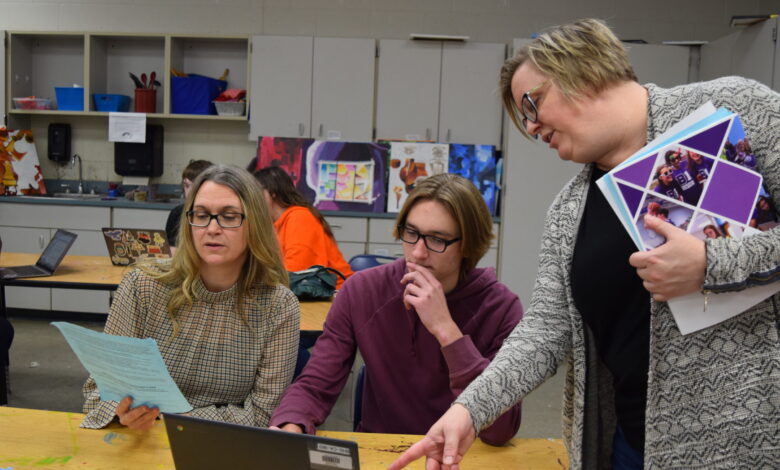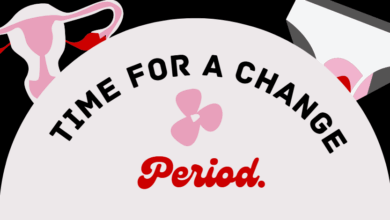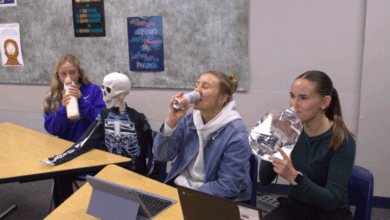Registration Night: Practical or Pointless?
[Opinion] The new management of class registration

To begin the Friday morning class period, a BHS teacher greeted their students with a question: “How was registration night?”
A mutual groan erupted amongst students. “It was so pointless,” one student shouted out. Nods and grunts of agreement filled the room. For this class, it was unanimous: registration night, which had taken place the night before, was not worth students’ time.
While the night wasn’t completely pointless, it also wasn’t worthwhile for all students. So what are the reasons that it was beneficial? What made it unnecessary?
For students who need a lot of guidance, registration night was successful. Through an opportunity to touch base with their advisor and ask any questions they may have, students were able to successfully register in a way that was fit for them. Additionally, parents/guardians of registering students were able to better involve themselves in the registration process. Many parents/guardians find it important to be involved in decision making regarding their students’ education, and the night provided an easy opportunity to accomplish this.
“We want to be as effective as possible in setting up a schedule for next year that meets the needs of our students,” Principal Mark Mischke said. “So in order to do that, we need to have accurate registration information.”
To accomplish this, advisors were involved in making sure all of their students complete their registration by filling out their whole schedule. Additionally, students were required to fill in alternate classes to ensure that they are taking classes they are interested in if they are unable to get into their first choice classes. By getting multiple sets of eyes on each student’s registration plan, incomplete plans were less likely to slip by.
In addition to current high school students, current eighth grade students were among the crowd present the night of registration. To begin their high school experience, eighth grade students and families met in the Performing Arts Center, where Mischke gave a presentation highlighting the core values of BHS, what it means to be a member of the BHS community, what students should expect out of high school and what is expected of them, and more. After the presentation, students and families were given the chance to explore the school, asking questions and talking to teachers and high school student volunteers about courses offered at BHS. To its credit, this was an effective way to involve parents and guardians in the registration process for their upcoming high schooler.
“The only people who bothered to go to registration night were the same people who would’ve been on top of it anyway,” one junior stated.
For students well-versed in the registration process, the night was seen as a waste of time. It was unclear to these students why there was a need to attend the event. After all, they were able to register on their own, and many took advantage of this opportunity. Additionally, not many people who needed significant help attended registration night anyway.
As well as being unnecessary for students who were experienced in registering, the event was poorly communicated. Day of, many students were still confused about the format of the night. According to Mischke, communication with students was attempted, but he was aware that it didn’t get through to all students.
“Last Thursday afternoon, just as an awareness, we shared our monthly newsletter,” said Mischke. “It isn’t always read by all of our students, but we send it to our kids [as well as families].” Other than the monthly newsletter, a voicemail was left in the inbox of BHS students and families, but there was minimal communication during the typical school day. Because of this, many students were unsure of what they were supposed to do for registration. Many thought the night would be an important communication of new information, but in reality, it was the same quick and easy process that many students have experience with and would have been able to complete on their own. Because of the lack of clear communication, many students were frustrated by the amount of time they spent at registration night.
“I was there for 15 minutes tops,” said another junior. “There was no need for me to be there.” Because of this, many students took advantage of the ability to register at home. If this was the route they wanted to take, these students were required to turn in their registration forms with their advisor the next day.
Through talking with advisory teachers, many advisors were okay with their students not attending registration night, but rather registering for the upcoming year during advisory. The two advisory periods following the night will be dedicated to this, so why was there a need for a night dedicated to registration? Being that registration is something that needs advisor approval and checking, it would’ve been more worthwhile for students to get registration help during advisory, rather than spending a short amount of time at school for something that could have been completed in a more efficient manner.
Many staff members were just as frustrated with registration night as students and families were. BHS teachers are contracted to work four evenings outside of school hours each year where they are required to interact with students and families. While running the block schedule, all four of these nights were conference nights, which gave students and families a chance to check on student grades once per quarter. With the switch to the trimester schedule, only three conference nights are needed. Because of this, registration night was added in place of the last required evening.
Numerous families thought registration night was pointless due to the short amount of time they were in the building for. Many spent more time getting to and from the event than they did registering for their child’s upcoming school year.
From the perspective of many teachers, there would have been a better way to build relationships with students and families. Some felt guilty about having families using their personal time to help with registration that students were previously able to do on their own.
Overall, it is clear that registration night was created with the intent to help make the registration process go as smoothly as possible, but it was partially ineffective in doing so, being that it only targeted certain people. It was beneficial to students who were in need of an adult to walk them through the registration process, but for experienced students, the evening was a waste of time. This event would be better approached as an optional event for students and families who are looking for extra help navigating the registration process.





